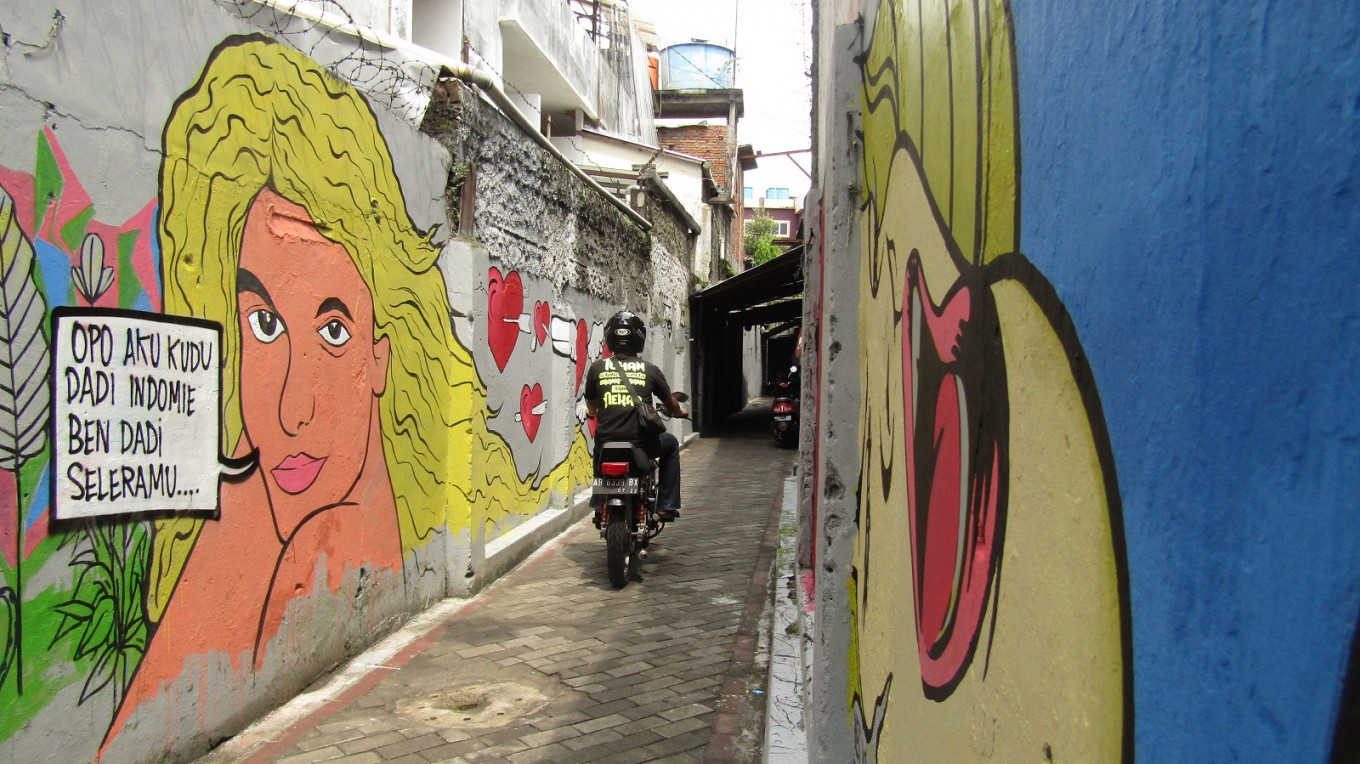Popular Reads
Top Results
Can't find what you're looking for?
View all search resultsPopular Reads
Top Results
Can't find what you're looking for?
View all search resultsArtists band together to advocate for sex workers in Yogyakarta’s Pasar Kembang
The Yogyakarta kampung has served as a red-light since the Dutch colonial era and the sex workers are said to have contributed to the local economy as many of the locals can be found selling food and drink and opening karaoke and accommodation businesses.
Change text size
Gift Premium Articles
to Anyone
T
he walls of Sosrowijayan Kulon alley in Pasar Kembang are now adorned with vintage comic-style murals depicting the lives of the area’s female sex workers.
One of them is a mural of a red-lipsticked woman with long blonde hair and the quote “Opo aku kudu dadi Indomie ben dadi seleramu (do I have to be a [popular instant noodle brand] Indomie for you to like me).
Luna, a member of the Yogyakarta Sex Female Workers Association (P3SY), told The Jakarta Post that the mural depicted the sorrows of sex workers in Pasar Kembang, which is located near the heart of Yogyakarta, Malioboro.
“The image of the blonde woman shows how sex workers have to appear as beautiful as possible. Sometimes we’re already trying our best to look pretty, but still don’t get any attention,” she said.
The arrival of newcomers also makes the competition tougher.
The murals in Pasar Kembang are the work of artist Iwan Wijono and his friends as part of the Pasar Bungah Care for Art and Culture activity, which was held on Feb. 14 as part of the month-long Pasar Kembang (Sarkem) Festival.
Read also: Vinolia Wakijo's ongoing journey to teach society about 'waria'
“This activity is held to advocate for the marginalized sex workers,” said Iwan, who initiated Pasar Bungah alongside Sosrowijayan Kulon kampung committee members in a bid to preserve the place’s existence.
The kampung has served as a red-light district since the Dutch colonial era and the sex workers are said to have contributed to the local economy as many of the locals can be found selling food and drink and opening karaoke and accommodation businesses.
As the night came, an art performance was held at Sosrowijayan Kulon Hall, among the audience were the female sex workers and their clients who happened to pass by.
Among the performances were those by the Sonosewu group, which sang cultural songs and Hungarian artist Bern Atom Santi, who belted out folk songs from his country. Orsay Eugene presented the “Tanpa Judul” (Untitled) performance, during which audience members were asked to write down their sins on his body as he wanted to feel them and avenge them with kindness.
A sex worker named Lastri joined the artists by performing a dance.
“Many sex workers could not participate in this activity since they had to undergo HIV/AIDS testing in a nearby kampung,” said Iwan, adding that workshops such as those on knitting and other skills had been offered. “[These skills] allow them to build courage and survive wherever they are.”
Pasar Bungah itself is said to benefit the locals as it helps them promote their economic potential. “We’re planning to hold it again [in the future],” said Sosrowijayan Kulon community unit (RW) 3 head Sardjono.
Luna is hopeful that Pasar Kembang can become a comfortable workplace for the workers. “I wish for no arrests. Don’t just corner women as we need to study first why men still need sex worker services.”
Dr. Tri Kusumo Bawono, who can be found accompanying commercial sex workers in Yogyakarta, said maintaining the red-light district in Yogyakarta had made it easier to monitor the workers’ health and the spread of HIV/AIDS.
“If it is closed down, they will spread and we will have difficulty in detecting the spread of HIV/AIDS,” he said, adding that the area allowed him to build a good relationship with the workers, which helped him provide them with sex education.
“If something happens, they will immediately tell us,” Tri said.
Gama Triono, former executive director of the Yogyakarta office of the Indonesian Planned Parenthood Association, agreed that the red-light district should continue its operations, meanwhile the administration and other parties should provide health services.
“The association, alongside relevant parties, also initiate agreements to create a system to combat abuse cases against sex workers. There are some cases that are being processed by the police although [have yet] to make it to court,” he said. (kes)











